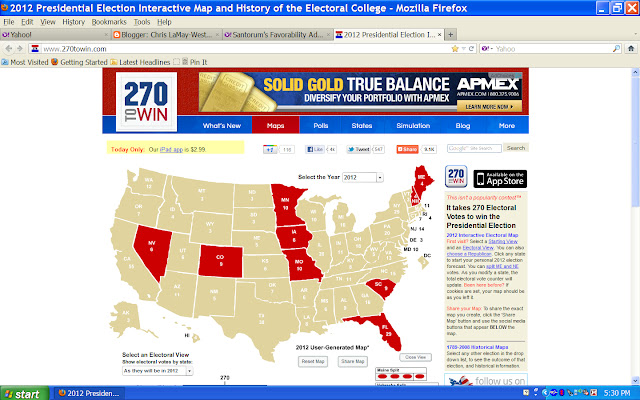This is in no way, shape or form an attack on the former governor politically or personally. Personally, he seems like a pretty decent guy, and politically, as far as Republicans go, I actually liked him tolerably well in his original pragmatic, moderate form. This is, as you'll see below, an examination of cold, hard mathematical fact. As for "ever", well, it's always nice when you can slip some hyperbole into your headline. "Weakest ever" may be a little over the top, but again, as you'll see in cold hard numbers below, for Republican nominees after 1968, so far it's an accurate statement.
Let's start with some pictures. Nearly 1/10th of the states in the Union have now spoken:
Granted, these are mostly smaller states, adding up to less than 100 electoral votes in total. But a quick look at the tallies from these states is interesting (my figures, based on final tallies for all but Maine):
So far Romney is clearly running ahead of the pack, but somewhat underwhelmingly.
To get a sense of just how underwhelmingly, it helps to do some comparison. As I mentioned last week, Democrats, as a more fractious lot, often end up having nominees who barely clear 50% of total votes in their primary and caucus contests, or even fall under 50%. For Republicans, though, this is much more uncommon. Taking all contested nominations (i.e. not considering candidates like Reagan in 1984 or Clinton in 1996 who ran without any serious opposition for their nominations) since the modern primary system rules were substantially reformed after 1968, only one Republican nominee has received less than 50% of the total votes (figures from Wikipedia, so they must be accurate):
Think about these numbers for a second. John McCain in 2008, a candidate that the Conservative base of the party was very distrustful of and who was running when the party was having a major post-Bush crisis of confidence, is the only Republican in the modern era to get below 50% of his party's votes on his way to the nomination. And Mitt Romney, so far, is running below that level.
"Ah yes," you might say, "so far!" Granted, you would expect Romney's totals to build as the race goes on. But maybe not by a whole lot, and maybe not terribly fast. We can, for instance, look at current national polls at Real Clear Politics:
Santorum is now the fourth (or fifth, if you count Gingrich as having done it twice) candidate in the last six months to jump to a national lead versus Romney. The latest polls indicate he now ties Romney for favorability among Republicans generally, and leads among Conservatives. On a state-by-state basis, the latest polls from Michigan show Santorum ahead for the February 28th primary there, and, moving in to Super Tuesday (March 6th), Gingrich has about even odds for taking Ohio according to fivethirtyeight.com, and leads in his native Georgia according to almost all polls there. Even in Arizona, where Romney is heavily favored to win on February 28th, he struggles to get to 50%.
So, at least through Super Tuesday, by which time almost half the states in the union will have held primaries or caucuses, Romney is very unlikely to rise above 40-something percent of the total cumulative vote. I would even submit that Romney may be getting close to the point where he can't sew up the nomination until June, and maybe not even by then. As Hillary Clinton can tell you, this point can creep up on you earlier than expected.
Again, a little math is in order:
| 2,043 | Delegates remaining to be selected as of 2/14/12 |
| 1,046 | What Romney still needs (1,144 total, minus 98 he currently has according to the Real Clear Politics tally) |
| 51.2% | Percentage needed |
Skipping back to the vote tallies by state earlier in this column, Romney's running at 39% so far. He's only topped 40% in two of the nine states that have voted, and hasn't reached 51% in any of them. The math is a little wrinklier than that, since there are several winner-take-all contests (though fewer than there were even as recently as 2008), but the point is, the math is already tilting towards this going on into June.
There's only been one Republican nomination contest like that in the modern era, when Ronald Reagan nearly outran the incumbent President Gerald Ford in 1976. Ford, of course, went on to lose the general election. Further food for thought: At 39%, Romney is not only bringing in a lower share of the total than any Republican nominee after 1968, he's three spots from the bottom for any nominee of either party. Those spots belong to candidates who went on to lose 49 of 50 states in the general election.
I am not, of course, predicting that. While Obama's chances for reelection have definitely ticked up over the past few weeks, all signs still indicate a close fight. But it is still an extraordinary sight to see a Republican nominee going in to that fight with support this soft.




2 comments:
Chris, I find your facts and numbers to be very cold and hard. Keep the essays coming, hope you're not freezing your butt off back East!
Sean, I do like it cold and hard... No, wait, what I mean to say is: Winter, from I hear, is pretty mild this year, and I've been doing okay. How are you?
Post a Comment